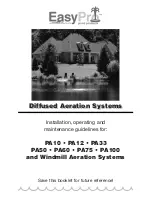
MST13013 3 07/12/14
SETUP INSTRUCTIONS
This is the safety alert symbol used for the SETUP INSTRUCTIONS section of this manual to alert you to potential personal
injury hazards. Obey all instructions to avoid possible injury or death.
Refer to parts breakdown on page 5 and 6:
1. Remove the plug fittings in the air and hydraulic access holes. The threaded air inlet hole is at the end of the pump where the
word "pump" is on the foot pedal. The threaded hydraulic hole is at the opposite end of the pump. Remove any remnants of
teflon tape or thread sealer from the holes before installing hoses or air disconnect fittings.
2. Make sure the hose fitting threads are not cross threaded. Use at least 1-1/2 wraps of teflon tape (or suitable sealant) on the
threads. Make sure the first complete thread is free from tape or sealant so they do not enter and contaminate the hydraulic
system.
3. Install the air quick disconnect configuration of your choice in the threaded hole back by the foot pump pedal labeled "pump".
Apply teflon tape or sealant to the threads as instructed in step 2 before installation. At the other end of the pump, install the
hydraulic hose in the same manner.
4. If tubing is used instead of hose, make sure the tubing is supported. Unsupported tubing can lead to premature fitting failure.
Always hard mount valves and gauges and never allow tubing to support them. Place tube supports 4 to 7 inches behind the
fitting.
5. The top forward section of the pump includes a large hexagonal plastic screw that must be replaced with the air vent screw
(54). The pump will not work to its maximum efficiency unless the air vent screw (54) is installed.
6. An in-line filter/regulator/lubricator should be installed close to pump. Add a few drops of SAE 30 oil to the air intake weekly if
no lubricator is used or when pump will be idle for a long time.
OPERATING INSTRUCTIONS
This is the safety alert symbol used for the OPERATING INSTRUCTIONS section of this manual to alert you to potential
personal injury hazards. Obey all instructions to avoid possible injury or death.
1. Determine the layout of your hydraulic system based on the work to be performed. If the pump is used with a ram in collision
repair work or in a press as a power source, there will most likely not be a need to consider installing a flow control valve. If the
pump is used with a ram that activates a shop crane boom or any other mechanical leverage that would increase the rate of
descent of such leverage when the pump pedal is released, install a flow control valve between the pump and the ram.
IMPORTANT:
Before using the pump under load, become familiar with the operation of the foot pump. Depressing the foot pedal end
marked "pump" activates the ram. To activate the ram a small distance, it is necessary to use incremental taps of your foot on the
foot pedal until the ram reaches the desired distance. Retracting the ram is accomplished by depressing the foot pedal end marked
"RELEASE". The pump is equipped with a two speed release mechanism. Gently depressing the foot pedal end marked "RELEASE"
retracts the ram slower then if you depress the pedal all the way down. If you want to retract the ram slower than the low speed
release, use gentle incremental taps of your foot on the "RELEASE" pedal.
2. Be sure hoses do not have cracks, kinks, cuts or other damage which might cause the hoses to leak. If hoses include spring
guards, make sure the springs protect the crimped areas of each end of the hose.
3. Hose should not be twisted or bent too sharply. The bend radius should not be less than nine times the outside diameter of the
hose. Always use as few bends as possible.
4. Make sure all hose ends, couplers, or union ends are clean and threads are in good condition.
5. Make sure all hose connections between pump and rams are tight and leak free. Do not over-tighten connections. Excessive
tightening may cause premature thread or fitting failure.
6. When using quick disconnect fittings, make sure fittings are correctly and completely fastened together.




































